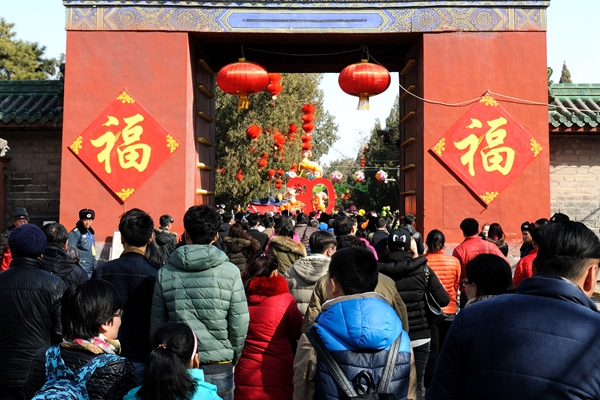 |
|
Visitors line up to enter Ditan Park in Beijing on Feb 23, 2015. [Photo by Gong Wenbao/Asianewsphoto] |
Is the traditional Spring Festival disappearing? This question was a hot topic on domestic social networks during this year's Lunar New Year holiday, with many saying the Spring Festival is no longer what it used to be.
But to answer that question, we need to know what the Spring Festival is.
For most Chinese, the Spring Festival has always been an annual family reunion and a precious week-long break from their normal daily routines. And that is something that hasn't changed. Visiting parents during the New Year holiday is still the first choice for most people working or studying far from home.
From Jan 24 to Feb 2, whether by plane, train, boat or bus, 740 million trips were made, 2.5 percent higher than last year. And during the peak travel period, the three days before New Year's Day, 82 million people a day were on the move, heading back to their hometowns.
And that doesn't include those who made their journeys by car, motorcycles or even bicycles. Yang Guojing, a forklift truck driver in South China's Guangdong province, for instance, rode a bicycle for five days and nights to cover the 800 kilometers to his hometown. Yang's determination shows for Chinese people going home for the Spring Festival is a case of where there's the will, there's the way.
However, some claim the traditional Spring Festival is disappearing because a growing number of people are choosing to celebrate it overseas.
On Feb 8, the Lunar New Year, the China National Tourism Administration estimated 300 million trips overseas would be made in the Spring Festival period. The Spring Festival holiday has become a big and still expanding tourism market.
However, many of these trips are made by families choosing to celebrate the Lunar New Year overseas. While it isn't home and some of the traditional ways of welcoming the New Year may be absent, they are still celebrating the Spring Festival.
In fact, some of the old traditions associated with the Lunar New Year are becoming less evident back home. Many cities introduced bans or restrictions on setting off fireworks this year. In Zhengzhou, capital of Central China's Henan province, for example, fireworks were forbidden in nine out of its 10 districts. In Beijing, street cleaners cleaned up 412.99 tons of the residue from fireworks on Feb 8, the peak day for setting off fireworks. This was 33.81 percent less than last year.
That's a positive change, and one many people are willing to embrace, because it helps maintain good air quality and reduces the number of injuries and fires that happen at this time of year.
Another habit that is changing is the visiting of friends and relatives. A popular online observation was that in the 1990s people visited each other during the Spring Festival, in the 2000s, people telephoned each other, now people offer our New Year greetings via social media.
That change is not surprising, as each generation adopts the latest communication technology. For those in their early 20s, WeChat and other social media are an everyday part of life and they want to greet each other in a convenient way instead of making it a ritual. Some youngsters complain about being "forced to call" their relatives by their moms, a typical generation gap.
Thus there is no need to worry about Spring Festival disappearing, because it is simply a case of the more things change, the more they stay the same. We still celebrate it, just in different ways with changing traditions.
The author is a writer with China Daily. zhangzhouxiang@chinadaily.com.cn

I’ve lived in China for quite a considerable time including my graduate school years, travelled and worked in a few cities and still choose my destination taking into consideration the density of smog or PM2.5 particulate matter in the region.